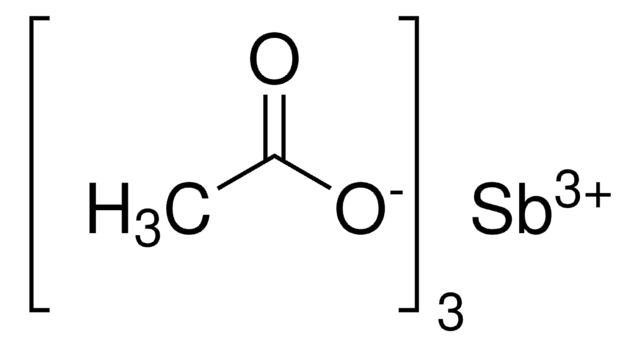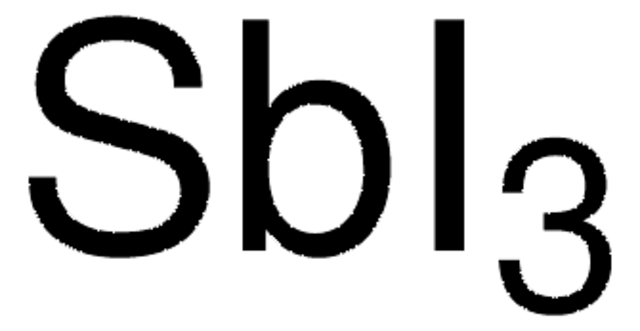337374
Antimony(III) chloride
≥99.95% trace metals basis
Synonym(s):
Antimony trichloride
About This Item
Recommended Products
vapor density
7.9 (vs air)
vapor pressure
1 mmHg ( 49 °C)
Assay
≥99.95% trace metals basis
form
crystalline
reaction suitability
reagent type: catalyst
core: antimony
impurities
≤500.0 ppm Trace Metal Analysis
mp
73.4 °C (lit.)
SMILES string
Cl[Sb](Cl)Cl
InChI
1S/3ClH.Sb/h3*1H;/q;;;+3/p-3
InChI key
FAPDDOBMIUGHIN-UHFFFAOYSA-K
Looking for similar products? Visit Product Comparison Guide
Related Categories
Application
- Obtaining of nanosized compound Sb2S3: This study focuses on the formation of Sb2S3 nanorods using antimony(III) chloride, relevant for material science applications in semiconductors and sensors (Guseynov et al., 2017).
- Highly Efficient Light‐Emitting Diodes Based on an Organic Antimony (III) Halide Hybrid: This study presents applications in optoelectronics, specifically in the development of efficient light-emitting diodes, of interest to material science chemists (Li et al., 2022).
- Antimony (III) halide compounds of thioureas: Structures and biological activity: This research explores the biological activity of antimony(III) halide complexes, which could be of interest to drug discovery chemists looking for novel therapeutic agents (Hadjikakou et al., 2014).
Signal Word
Danger
Hazard Statements
Precautionary Statements
Hazard Classifications
Aquatic Chronic 2 - Skin Corr. 1B
Storage Class Code
8A - Combustible corrosive hazardous materials
WGK
WGK 2
Flash Point(F)
Not applicable
Flash Point(C)
Not applicable
Personal Protective Equipment
Certificates of Analysis (COA)
Search for Certificates of Analysis (COA) by entering the products Lot/Batch Number. Lot and Batch Numbers can be found on a product’s label following the words ‘Lot’ or ‘Batch’.
Already Own This Product?
Find documentation for the products that you have recently purchased in the Document Library.
Customers Also Viewed
Articles
Solvothermal synthesis of nanoparticles: applications from nanocircuits and nano-optical circuits to nanomagnetics and biotech.
Solvothermal synthesis of nanoparticles: applications from nanocircuits and nano-optical circuits to nanomagnetics and biotech.
Solvothermal synthesis of nanoparticles: applications from nanocircuits and nano-optical circuits to nanomagnetics and biotech.
Solvothermal synthesis of nanoparticles: applications from nanocircuits and nano-optical circuits to nanomagnetics and biotech.
Our team of scientists has experience in all areas of research including Life Science, Material Science, Chemical Synthesis, Chromatography, Analytical and many others.
Contact Technical Service









